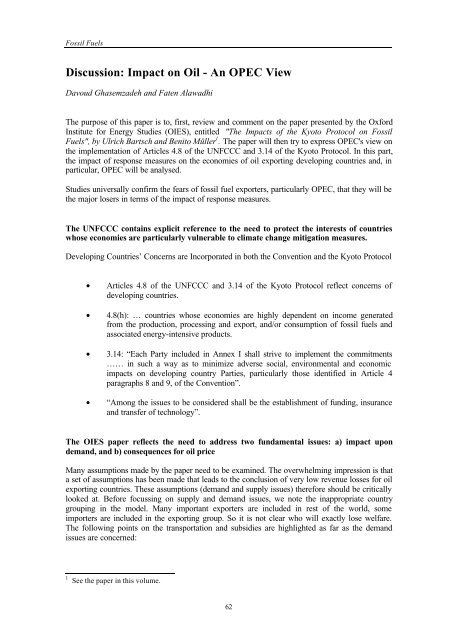sectoral economic costs and benefits of ghg mitigation - IPCC
sectoral economic costs and benefits of ghg mitigation - IPCC
sectoral economic costs and benefits of ghg mitigation - IPCC
You also want an ePaper? Increase the reach of your titles
YUMPU automatically turns print PDFs into web optimized ePapers that Google loves.
Fossil Fuels<br />
Discussion: Impact on Oil - An OPEC View<br />
Davoud Ghasemzadeh <strong>and</strong> Faten Alawadhi<br />
The purpose <strong>of</strong> this paper is to, first, review <strong>and</strong> comment on the paper presented by the Oxford<br />
Institute for Energy Studies (OIES), entitled "The Impacts <strong>of</strong> the Kyoto Protocol on Fossil<br />
Fuels", by Ulrich Bartsch <strong>and</strong> Benito Müller 1 . The paper will then try to express OPEC's view on<br />
the implementation <strong>of</strong> Articles 4.8 <strong>of</strong> the UNFCCC <strong>and</strong> 3.14 <strong>of</strong> the Kyoto Protocol. In this part,<br />
the impact <strong>of</strong> response measures on the economies <strong>of</strong> oil exporting developing countries <strong>and</strong>, in<br />
particular, OPEC will be analysed.<br />
Studies universally confirm the fears <strong>of</strong> fossil fuel exporters, particularly OPEC, that they will be<br />
the major losers in terms <strong>of</strong> the impact <strong>of</strong> response measures.<br />
The UNFCCC contains explicit reference to the need to protect the interests <strong>of</strong> countries<br />
whose economies are particularly vulnerable to climate change <strong>mitigation</strong> measures.<br />
Developing Countries’ Concerns are Incorporated in both the Convention <strong>and</strong> the Kyoto Protocol<br />
• Articles 4.8 <strong>of</strong> the UNFCCC <strong>and</strong> 3.14 <strong>of</strong> the Kyoto Protocol reflect concerns <strong>of</strong><br />
developing countries.<br />
• 4.8(h): … countries whose economies are highly dependent on income generated<br />
from the production, processing <strong>and</strong> export, <strong>and</strong>/or consumption <strong>of</strong> fossil fuels <strong>and</strong><br />
associated energy-intensive products.<br />
• 3.14: “Each Party included in Annex I shall strive to implement the commitments<br />
…… in such a way as to minimize adverse social, environmental <strong>and</strong> <strong>economic</strong><br />
impacts on developing country Parties, particularly those identified in Article 4<br />
paragraphs 8 <strong>and</strong> 9, <strong>of</strong> the Convention”.<br />
• “Among the issues to be considered shall be the establishment <strong>of</strong> funding, insurance<br />
<strong>and</strong> transfer <strong>of</strong> technology”.<br />
The OIES paper reflects the need to address two fundamental issues: a) impact upon<br />
dem<strong>and</strong>, <strong>and</strong> b) consequences for oil price<br />
Many assumptions made by the paper need to be examined. The overwhelming impression is that<br />
a set <strong>of</strong> assumptions has been made that leads to the conclusion <strong>of</strong> very low revenue losses for oil<br />
exporting countries. These assumptions (dem<strong>and</strong> <strong>and</strong> supply issues) therefore should be critically<br />
looked at. Before focussing on supply <strong>and</strong> dem<strong>and</strong> issues, we note the inappropriate country<br />
grouping in the model. Many important exporters are included in rest <strong>of</strong> the world, some<br />
importers are included in the exporting group. So it is not clear who will exactly lose welfare.<br />
The following points on the transportation <strong>and</strong> subsidies are highlighted as far as the dem<strong>and</strong><br />
issues are concerned:<br />
1 See the paper in this volume.<br />
62
















